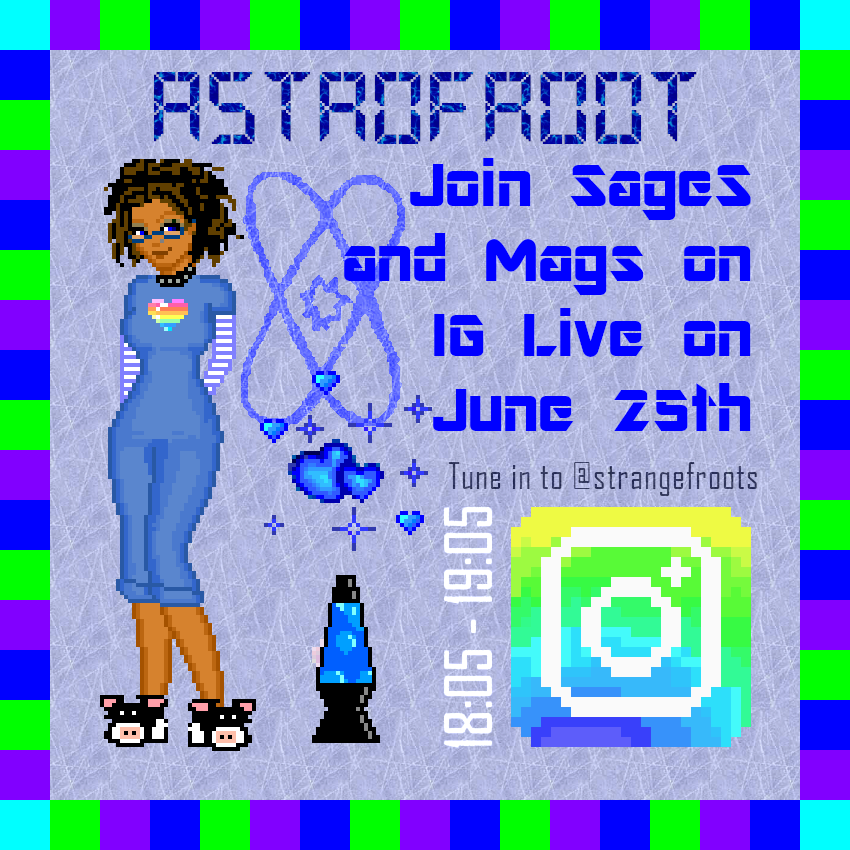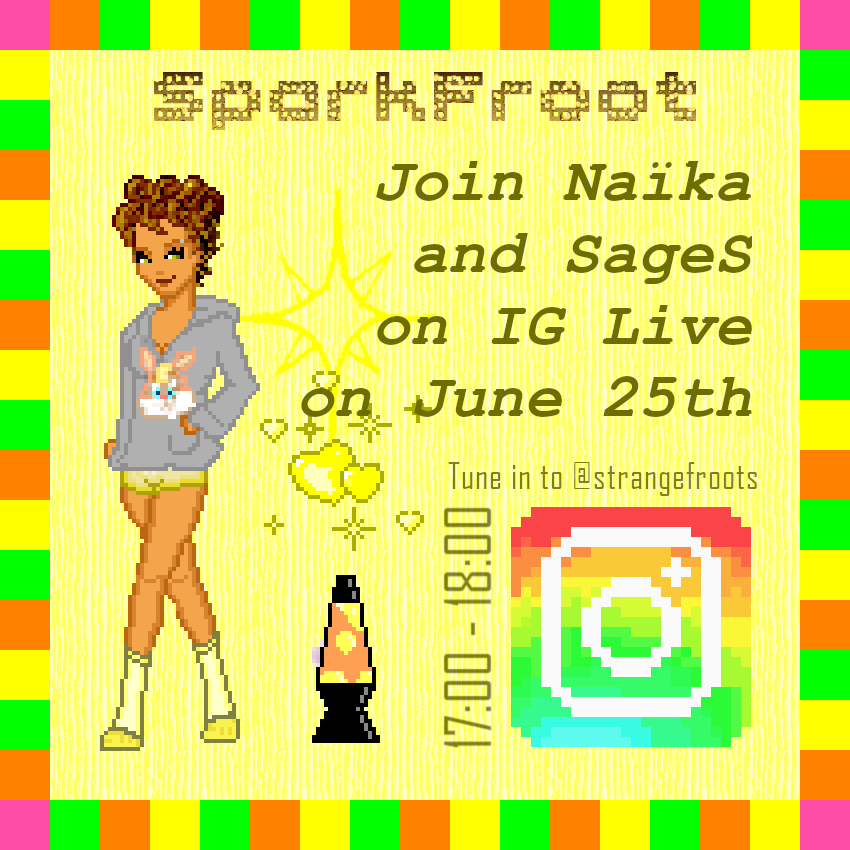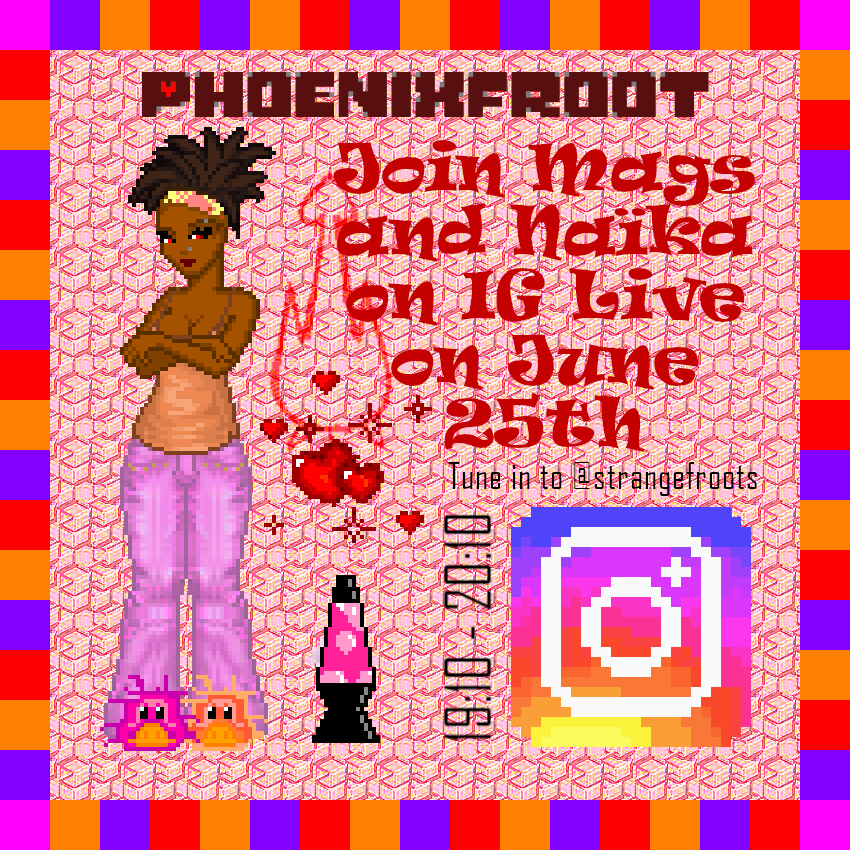From Beatmaking Workshops to Community Leaders: These are the Froot Origins
If you haven’t heard of Montreal’s Black, queer, hip-hop trio Strange Froots already, it’s about time you drop everything and check out their entire discography on Bandcamp… STAT. The group is comprised of the talented Mags aka Passion Froot, Naïka aka Dragon Froot, and Sage aka Star Froot. Next week, Strange Froots will be celebrating their 6th anniversary as a band with us by throwing a Digital Sleepover — and you’re all invited! Come play our favorite party games, learn trivia about local artists, and have an open discussion about the COVID-19’s impact on our community, as well as the contributions made by its Black artists! DJ Mollygum will also be playing the after party.
The event will be streamed online, and will also serve as a partial fundraiser, with the proceeds donated to the Black Lives Matter DC, Regis Korchinski-Paquet’s family, to Taking What We Need (a Montreal-based discretionary fund group for low-income trans women) and Also Cool Mag's Artist Emergency Fund. Janice Ngiam (of Sun Astronauts), has volunteered her talents and allyship all the way from Hong Kong. For every new donation 20$CAD or more, Janice will produce a short, personalized song about anything you want! Discover her music at www.janicengiam.com/music.html
Join the Froots this Thursday on Instagram from 5pm to 8pm for a Frootiversary Happy Hour, and get a taste of what's to come this Saturday!
We got the chance to catch up with the Froots to reminisce on their early beginnings, discuss their future aspirations, and hear their thoughts what work has to be done to make Montreal’s hip-hop circles more inclusive and safe for QTBIPOC folks. Check out our interview below!
Strange Froots (from left to right: Mags, Sage and Naïka), photo by Didi M’bow
Also Cool: Before we begin, tell us who you are and about your individual artistic pursuits.
Mags aka Passion Froot: My name is Mags. I’m an illustrator, cartoonist and graphic artist by trade, as well as a beatmaker, singer-songwriter, MC and casual guitarist.
Naïka aka Dragon Froot: My name is Naïka, I’m a Haitian, queer, Black woman. I’m a singer-songwriter, a guitarist, a bassist, and an MC. I recently released my first solo album, Painted Imageries, this past January.
Sage aka Star Froot: Hello, I’m Sage! I'm a singer, songwriter, actor and producer. I am also a passionate linguist, studying Spanish and Mandarin. Learning languages is a really interesting and ceaseless artform to me.
AC: Individually and collectively, how has music helped you learn and grow?
M: On an individual level it has helped me spiritually for as long as I can remember, producing (more so than writing) has somewhat helped me translate my journey to sound. It’s also helped me reconnect to my ethnic origins as a first-generation African-American; in learning how to sample, I’ve been able to reimagine classic songs my parents would play around the house, or that I would hear over the summers of my childhood visiting relatives. As part of a collective, I think I’ve been able to contribute the story-telling attributes of my instrumentals, as well as the eclectic sounds of our diaspora.
N: Individually, music has helped me grow into who I am and explore every facet of what I am., [Music] has given me the ability to express myself in a way that can be scary, but at the end of the day, honestly. Collectively within Strange Froots, this band’s music has allowed me to step out of my comfort zone by pursuing artistic directions and musical styles that are not necessarily my go-to. The band keeps challenging the ways that I write, compose, and structure music, and I love that about Strange Froots.
S: Music has given me a way to express myself creatively and honestly. As a dynamic introvert, I spend most of my time reflecting over socializing. Music has been a great conduit for me to both share who I am and bond with those in my circles. It’s how I found Mags and Naïka all those years ago. I can’t imagine life without music. If I don’t like the song, I’ll change it, but there are very few times where I’ll go for silence.
AC: What are the Froot origins? How did your diverse creative backgrounds come together for the first time?
M: At the time of our meeting (Spring 2014), I was in my last year at Concordia. I was VP Marketing and Communications for the then-named Hip Hop Heads Concordia, of which I am a co-founder; this was a revival of the university’s long-defunct hip-hop club. I had by this time already been acquainted with a few of Montreal’s hip-hop artists, and it’s through them that I was introduced to NoBad Sound Studio.
N: The manager of NoBad Sound at the time wanted to do a “girl” workshop, ‘cause few of them were at the studio and few were seen in hip-hop in general. It’s through this that our diverse creative backgrounds came together. I came up with the name Strange Fruits (paying homage to Billie Holiday and Nina Simone) for our band, as we are all Black and know what the song talks about: it was very dear to me, to us. Then Mags came up with the spelling “froots,” like the cereal, ‘cause we’re all nerds like that and are all pretty “out there”... fashion and personality wise, we’re all very colourful. But it says a lot too: the “roots” within fROOTs, refers to our Black roots, and it is also a derogatory gay term that was reclaimed by the queer community; which includes all of us in this band.
S: I was the last to arrive. I went to NoBad interested in beatmaking workshops, when I met Mags and Naïka days later. We shared our musical taste and gauged that we all had very different musical backgrounds. As the alternative member of our alternative-chill-soul collective, I am influenced by rock, house, jazz, pop, film scores, musicals, i.e. eclectic. I was also part of a theatre troupe and sang in choirs growing up, so working together came very naturally
Strange Froots (from left to right: Sage, Naïka and Mags), photo by Andrée-Anne Guy
AC: What is your creative process like as a collective, and how has this evolved over the years?
M: A lot of our collaboration these days (COVID withstanding) has happened digitally, sending beats, voice notes, guitar riffs and the like, due to ever-conflicting schedules. In the very early days, even after our first EP dropped, we would continue to meet up at NoBad and much of our collaborative efforts happened there. Then, you have songs like “Regular” that come about from very random inside jokes created well outside of the context of the band, and just from goofing around as friends.
N: OHHH child it has evolved! At first, we would all sit down together and write to a beat Mags or Sage produced, or a riff I played on the guitar. We held a lot of importance to composing all together in the same space and time, but it’s not always feasible and realistic. Now, we tend to write separately, propose something from one person who wrote, created a riff, laid down a beat and then the rest adds to it. We talk more openly about what we want to change, about directions of the sound. It’s literally a constant draft and constant back and forth within our capacities and availabilities, instead of depending on each other’s presence to finish a song.
S: I think now a major difference, especially with our individual artistic pursuits, is that we create music with an understanding of if it’s for Strange Froots or for another passion project. If I can imagine Mags dropping a fierce 16 or Naïka working magic with her bass for example, then it’s for Strange Froots. It was easier in the beginning to put us all in one room for a few hours to create, but later became very unrealistic.
AC: Since meeting through the NoBad Sound Studio workshops, do you feel that the Montreal hip hop scene has become more inclusive? In your view, what work has to be done to further grow hip hop spaces in this way?
M: In the 6 years of our existence, I’ve seen some slow, gradual efforts to not only include more cis women than they did at the time (because if we’re being honest that was their first hurdle). We’ve seen some kind of attempt at understanding and including the LGBTQ+ community. They’re not going to get it right all the time or on the first go, (some might even say there’s a sense of pinkwashing and “you-go-girl”-ism), but I’d like to think that our group’s existence helped create more waves in that direction, especially in the Black community.
N: Adding to that though, the Montreal hip-hop scene is VERY underground. The hip-hop that you see out there, that is being paid attention to, is mostly performed by white cis Francophone men. It completely disregards the Black and Latinx folks that laid the groundwork for hip-hop in Montreal, and the deeply ancestral history of hip-hop for Black folks. It’s our culture. In the last 10 years or so, Quebec suddenly “discovered hip-hop” from white kids, even though it’s been here for decades... So is it more inclusive to women? Meh, not really. We make our spaces. There needs to be a lot of work done for women in hip-hop and for queer folks. Hip-hop was made by marginalized folks who were Black and Brown: you have to include women and queer Black and Brown folks, not just the cis het straights, ‘cause they are marginalized as fuck.
S: I agree, there’s still a lot of work to be done. There is hope – queer and black artists like Backxwash lighting the ground up – but when it comes to the hip-hop scene in Montreal, space is sparse and divided. White Francophones are still the dominant voices of hip-hop in Montreal unless the event is specifically curated to showcase queer and POC voices. Considering the origins of hip-hop as a tool for the marginalized and oppressed, it is crucial that more queer artists of colour are able to share their multifaceted truth and be on the mainstage. I hope we can get to a point where black and queer-owned venues exist and our music is not competing for airtime and spots in the margins.
Strange Froots (from left to right: Naïka, Sage and Mags), photo by Kinga Michalska
AC: Beyond music and performances alone, Strange Froots has acted as a collective driving interdisciplinary collaboration in Montreal. How have you connected with the music community, and how has that had an impact on your outlook as artists and activists?
M: From experience alone, I’d say due to the varying types of shows we’ve been able to play, we’ve not only made some great friends and musical colleagues, but we’ve been able to connect them to each other in many ways. With amplifying other artists through our platforms and association came an organic sense of belonging, like, “some of us are synth artists and some of us do hip-hop and some of us are riot grrrls but fundamentally we want the same things.” I was able to adopt this mentality when I was approached to co-found the multidisciplinary winter festival Lux Magna in 2017, alongside certain members of the Suoni Per Il Popolo festival.
N: I’m a part of a collective that I I co-founded called Fruition. Fruition is by and for QTBIPOC, and ensures that we have the space to thrive and access the resources we need to survive, succeed and heal in spite of systemic racism, oppression, assimilation, colonialism. We create art/music events, workshops, panels with QTBIPOC folks within our community so they can tackle their artistry in a way that is safe and radical. Individually, that has a lot of impact on me to help me grow and feel even more secure in my identity, but has also helped me find tools to build within our community.
S: I find activism goes hand-in-hand with hip-hop, since injustice is not too far behind. In our collaborations with The Rap Battles for Social Justice, we had opportunities to explore deep rooted issues in our society, like austerity, police brutality, and climate justice. It inspired me to become more politically informed and recognize the power of music to facilitate important discourse. We are all writing our own artist blueprint while also having to navigate the erasure of inclusive physical spaces to share our art. In Montreal, the helping hand comes from utilizing our network and own creativity. That’s why it’s crucial to stay connected and support each other. I think it’s great that many collaborators are people we can also call friends, but at the very least, are people who share our values. These are people that I want to see flourish, so my activism is about standing up in the face of injustice and also facilitating joy as a form of resistance.
AC: Now that we are coming up on your anniversary; what has been a defining moment in your band’s history, and what are some of your future aspirations as a group?
M: Not to be a total Leo rising about it, but I think our priorities and our individual scopes had to severely shift when I was made to leave Canada. Long story short, I had a few bureaucratic hiccups regarding my status in Canada, and so I was turned away at the border when I was returning from a home visit from Silver Spring, MD. A lot of things were put on hold, and I attribute a lot of my shortcomings in taking care of my status, to hyper-focusing on keeping the band afloat. I held an unhealthy amount of self-worth in what I was able to do for the community and how I was able to alleviate my bandmates’ workload (I was the only one done with school), it took me away from myself in some very detrimental ways, and I think we’ve finally reached a place where we see that clear as day, and are constantly working to not repeat the mistakes that lead to several kinds of pressure and burnout. I hope that our group can continue influence positive and progressive change in Montreal’s youth, to make our queer circles less racist, and the hip-hop scene less queer and transphobic overall, and I hope as more doors open for us, we can hold them up for our friends in the game.
N: A defining moment in our history was going to Senegal and finally seeing our community of QTBIPOC fam come together when we put on hip-hop performances for queers. For future aspirations, I want us to keep creating and finding ways to create for ourselves, as a way to sustain imagery and art within our community.
S: I would love for us to all be in the same place physically for longer than a week! Technology helps, but our first in-person rendezvous will be something. The most defining moment for me so far has been our trip to Senegal. The connections made there and the wisdom shared will last with me forever. If the fates allow, I would love to journey with the Froots again to another motherland. Ultimately, I wish for more growth, love and understanding and for us to keep doing the work we do. The journey has been incredible so far. I’d like to see how much further we can go.
Strange Froots (from left to right: Sage, Mags and Naïka), photo by Mariel Rosenbluth















